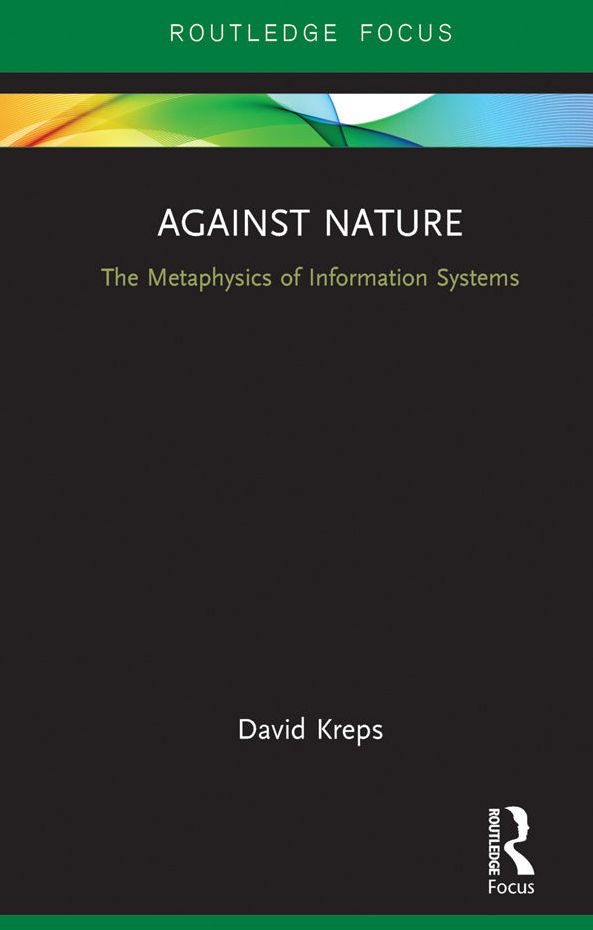An Interview with David Kreps: Author of Against Nature: The Metaphysics of Information Systems
by Kyle Wiggins
Published December 2018
David Kreps is Reader in the Philosophy of Information Systems at the University of Salford. His books include Bergson, Complexity and Creative Emergence (Palgrave, 2015); Technology and Intimacy: Choice or Coercion (Springer, 2016); This Changes Everything—ICT and Climate Change: What Can We Do? (Springer, 2018); and Gramsci and Foucault: A Reassessment (Routledge, 2015). His new book, Against Nature: The Metaphysics of Information Systems (Routledge, 2018), explores the ways that positivism, neo-liberal market economics, and information systems warp human understanding of the natural world. Kreps offers an alternative philosophy of green technology that better meets the imminent dangers of climate change. The book is measured, engaging, and issues timely suggestions on how digital innovation might counter ecological catastrophe.

Kyle Wiggins: I’d like to start broadly. The “Anthropocene”—as a term used to describe the current geological moment—seems to have infiltrated disciplines across the humanities and sciences. Economists, philosophers, ecologists, and media scholars, to name a few, have claimed it as the defining concern of their respective fields. What do you make of the Anthropocene gaining traction across so many fields? How do you feel about the term becoming something of a scholarly buzzword?
David Kreps: Disciplinary boundaries are increasingly becoming obstacles to clearer understanding, useful more to the bureaucracies of academic institutions and the publishing market than to the focusing of genuinely useful research. Multi-, inter- and transdisciplinarity are not only fashionable but required approaches to a whole host of problems—including, and perhaps especially, the most existential problem of our times, anthropogenic climate change. That the character of the climate change we are currently experiencing—that it is driven by human activity—should become the epithet by which we summarize the current geological epoch—the Anthropocene—seems eminently sensible, to me. My own view, in the debate around its origins, is that the Columbian Exchange in 1492, rather than by the splitting of the atom in 1945, catalyzed the Anthropocene, though I have some sympathy with the view that the Neolithic can be regarded as at the very least the prelude to the Anthropocene as an epoch.
That the term should gain traction across many fields and disciplines in global academia reflects both its reach and the necessarily contemporary nature of academic study, where pushing back the boundaries of knowledge requires being abreast of what is already known. Of course, all buzzwords get used by those who understand only the most superficial aspects of them, in an attempt to characterize rather unimpressive work as ground-breaking. This does not detract—certainly in this case—from the genuine importance of what the buzzword actually refers to, in depth and breadth. In fact, the more often it is used, the more we, especially in the West, will, hopefully, engage with what it implies: that we are not only masters of our fate, but that some responsibility for our actions is now existentially important, and we should learn how to organize the satisfaction of our wants and desires with more long-term considerations in mind. The philosophical implications of the Anthropocene, in particular, are quite challenging to those for whom free will is a part of theological debate. Either anthropogenic climate change is simply a predictable cancer amongst the higher apes causing a sixth great mass extinction, or we have made choices that have made the mess we are in and can—and should—try to make new choices to get ourselves out of it.
KW: That’s deftly put. I’m struck by the urgency in your answer, that the Anthropocene (as a field of knowledge) demands reckoning with the environmental consequences of human activity right now. I’ve felt a similar immediacy while putting together this special issue of NANO. Yet, I’m even more taken with the hopefulness in your response here and in your book, Against Nature. You believe it’s possible for humans to make a livable future on this planet. That optimistic streak, though, runs counter to much of the recent writing on the Anthropocene that is also urgent but, frankly, cataclysmic. Do you view yourself as someone who pushes against a rhetoric of despair accompanying discussion of the Anthropocene? What gives you hope that humans might, as you put it, get out of the mess we are in?
DK: As Madeleine Albright describes so eloquently in her new book, Fascism: A Warning, the US retreat into isolationism after the First World War almost certainly contributed to the rise of Fascism in Italy and Germany in the 1920s and 30s, and the Marshall Plan and range of global liberal institutions like the UN, World Bank, IMF and so on, that have helped to encourage both peace and unprecedented prosperity in the decades since, was the considered response after the Second World War. Far from perfect, of course, but a lot better than the 1920s! I am hopeful that the US will again, after faltering somewhat, rise to the challenge.
Fearsome and awful though the present moment most certainly is, with a proto-Fascist in the White House of all places, I nonetheless cling to the hope that movements like the Justice Democrats and the groundswell of change surrounding Bernie Sanders in recent years might yet put someone worthier of the role into the Presidency of the United States. It is very sad, but the US is almost certainly the biggest problem for the world with respect to climate change, right now. According to a recent report in Nature Communications (http://paris-equity-check.org) current pledges towards the Paris agreement, in terms of emissions reductions, from China, Russia and Canada, point us toward more than 5°C warming, and from the US and Australia more than 4°C. Even the EU’s pledges are currently likely to push us towards more than 3°C. But the ‘mood-music’ from the US in particular is of climate-skepticism. In this respect, China is starting to move ahead of the US, and in the determined transformation of its newly capitalist economy into something more sustainable, may reach much higher contributions to global emissions reductions sooner than the US. Russia, fortunately, is a pretty small economy by comparison. Europe is muddling along in the right direction, at various speeds, but clearly needs still to do more.
For all its incredible capacity to create the wealth that has lifted so many out of poverty around the world, capitalism unbridled—i.e. without the iron will of regulation to force it to be sustainable—could undoubtedly kill us all, in the end, and the US is the capital of capitalism. A left-leaning Democrat, unchained by the corrupting influence of corporate power, in the White House, could re-sign-up for the Paris Climate Accord, and help to negotiate something beyond it that is actually strong enough to prevent a warming disaster that could make the planet uninhabitable. As Mark Lynas depicted in his classic 2007 book Six Degrees, the last time, in the Pliocene, that the world was 3°C warmer than it is now, sea-levels were 25m higher. If we can just keep the rise below 1.5°C, as the recent IPCC report has recommended (https://www.ipcc.ch/sr15/)—the famous ‘tipping point’ beyond which things begin to run out of control—then there will likely be a human population that survives. We might salvage quite a lot. It is very hard to tell. We have already reached 1°C and the lag in the system promises more yet to come. We only have twelve years, according to the report, to turn things around.
Hope—yes, I have hope—hope that in the teeth of disaster we will snatch survival from the jaws of our own foolishness. Yes, I too have seen some of the more cataclysmic warnings. The mass extinction of flora and fauna—especially of pollinating insects—that is underway, is scarily portrayed in the recent ‘Brown to Green’ report (https://www.climate-transparency.org/online-launch-of-brown-to-green-report-2018). It will have immense ramifications upon food production, this is certain; many will perish; many more will pack up and move elsewhere, in search of a living. The warming of the world that has already been set in motion, which we cannot any longer prevent, will undoubtedly render certain areas uninhabitable. Cold will be colder, wet will be wetter, and hot will be hotter. The movements of such climate refugees in the immediate future, according to the Intergovernmental Panel on Climate Change (IPCC), will probably mostly be simply from rural to urban areas, and perhaps to adjacent countries. But if the 2°C barrier is breached, it is possible we might see larger and more long-distance movements away from the equator, crowding into the temperate zones where it is neither too hot, nor too cold, but probably a little too wet. No wonder nationalism is rampant in Europe right now—with several million Syrians and others in refugee camps on its southern borders; and this is just the start. Beyond 2°C warming we could conceivably see refugee movements on the kind of scale known in the history of the Steppe, which has seen many hundreds of thousands—whole peoples—move from northern and western China over the Altai, over the Ural mountains, west right across to the Great Hungarian Plain, displacing each other as they move, and south down onto the Iranian Plateau and into the Indus Valley. Such population movements have been ongoing for many thousands of years.
So yes, some level of cataclysm is on the way, and the ‘way of life’ we have become used to since 1945 is probably over. And all this before we reach the IPCC’s 1.5°C. But, we—as a species—have the opportunity to learn from our mistakes, and the sooner we do so the less cataclysmic the inevitable changes in our world will be. So, yes, I have hope. Despair is, to put it bluntly, playing into the hands of corporate greed. Those who despair just carry on with the bad practices that they are used to—because it no longer matters, right?—filling the coffers of those whose only interest is in today’s comfort for themselves. Despair is useful for those who are enriching themselves on our destructiveness.
KW: In Against Nature, you write eloquently about shortcomings in the academic work on information systems. Why have we, collectively, been so slow to acknowledge the connection between our information systems and ecology?
DK: It’s a strange story, because systems theory arose in the 1930s from biology and ecology—granting an understanding of how collectivities of organs, or of individuals within a species, displayed systemic properties. At the same time, however, the argument in economics was between whether individuals alone should be considered in mapping the economy, or systemic properties of collectivities of actors should or could be considered. Politics decided: Individualism was the American way, Collectivism was the Soviet way. After the Second World War, the academic field of economics, in the West, subjected to such methodological individualism—by which only arguments concerning individuals were acceptable in any and all cases—became well suited to the new technologies of computing. Computational economics, with its aura of high tech and scientific rigor, soon became the darling of Business Schools, which, up to that time, had been largely pragmatic in their approach. So, highly individualistic academic economics became, from the 1950s on, the centerpiece of Business School life, just when the field of information systems was coming into being, with the inevitable result that almost all business applications of computing technology for the coming decades were dedicated to making a highly individualistic capitalism as efficient as possible, which, of course, they have done, all too well. This connection—that our computing and business information systems are in fact helping to drive anthropogenic climate change through their merciless and individualistic efficiency—is probably none too obvious, and requires both a historical and philosophical backdrop of understanding to evince. Few in Business School information systems departments are encouraged to study any history or philosophy.
Of course, systemic properties of collectivities have since become much more of a focus of study right across the sciences, with complexity theory and network dynamics now at the heart of ecological science, as well as other academic endeavors. Business School economics, by contrast, has been left really rather far behind: subject recently to student revolts at the London School of Economics, no less, which are demanding a more open curriculum. A realization that for all our individuality, no man is an island, and we cannot survive alone, is gradually dawning not just in economics, but in information systems as well, and corporate social responsibility, data protection and privacy, and a raft of other far more social concerns, are beginning to make headway both in academia and the business world at large: none too soon. Avoiding greater than 1.5°C warming fundamentally requires both a strong sense of social responsibility and a willingness to regulate business, the combination of which would provide a level playing field that none can break, for our collective good. Methodological individualism, then, has to be defeated as a doctrine—across scientific endeavor, business ethics, and government policy—if we are to survive.
KW: I agree that avoiding the 2 degree damnation relies, in large part, on overhauling specific engines of climate change as well as a doctrine of individualism. In Against Nature, for example, you describe how under neoliberalism “a good citizen is a good consumer.” The dangers become readily apparent when you rely on the market to avert eco-disaster. But I want to press this argument a bit. What can shake self-interest on a global scale? How might the humanities, for example, initiate this great awakening? Is fear (that the planet becomes uninhabitable?) a power great enough to establish a new collectivism?
DK: Interestingly, I think the humanities—specifically in a Western sense, as they are practiced in Western higher education institutions—may be part of the problem. For all that I am, of course, myself a product of, and denizen of the West, I am struck by how the more recent counter-history of Western philosophy—Nietzsche, Bergson, Foucault, etc—seems to be crawling slowly, or as Jean and John Comaroff would say, in their book Theory from the South (2011), evolving towards, a more (pre-colonial) African approach to personhood and social organization. One might equally point to Indian and Chinese pre-Western epistemological, philosophical and social positions and practices. These pre-colonial positions—the Confucian ethics of kinship and loyalty, the compassion and consensus building in Buddhism, the Shinto, Hindu and Bantu attention to how dynamic forces work through ancestors, places, and communities—all seem to share in common a sense of relationality, context, and contingency as foundational conditions of possibility for self-concept in ways those of us brought up in the context of the West’s ‘autonomous individuality’ find quite difficult to conceive. (Working with Chinese and Japanese businesses has required some interesting education for American businessmen!) The diversity, variety and difference between all of these positions around the world seems more in the manner in which this relationality is played out—a diversity that would include Southern Theory, as Raewyn Connell titled her book (2007), and not just the theories of the Euro-American West.
In this sense, then —for Connell and the Comaroffs—as India approaches being the most populous nation on Earth, and Nigeria the third, by sheer weight of numbers those subjected to the imperial gaze of Euro-American Enlightenment generalizing in previous centuries might, in the coming decades, in any case shake off the dead hand of our Western parochial notions of identity and social structure, resulting in solutions with more collective responsibility. This, in turn, I would argue, should help us as a species to ensure the Anthropocene becomes characterized by greater care for the environment, for the benefit of all living things. This, of course, if the post-colonial adoption of Western sensibilities around the world is effectively subsumed by a resurgence in indigenous epistemologies. What we, then, in the Western humanities, might do towards helping along such a ‘great awakening,’ is, on the one hand, to develop more humility concerning our own theorizing, retreating from the knee-jerk universalism of our imperial past, and, on the other, doing our utmost to support, mentor, and assist in the development of indigenous knowledges founded in more collectivist traditions. A third effort, finally, would be for us to foreground our own counter-histories of collectivism more effectively, in a grand reassessment of the scholarly achievements of liberalism, in search of a better balance between the peculiarly occidental individualist creed and understandings more conducive to human survival. Even in our decline, then, the West might salvage some more collectivist settlement between the warring factions in our intellectual history, and make a genuinely useful contribution to global philosophy.
How this is to come about, of course, is another matter. Fear is rarely a useful force, unless one counts the advancement in awareness and composure achieved through overcoming it. Its successes as a tool of power are always short-lived and require one to up the ante as soon as resignation turns to more subtle forms of opposition. It is arguable that it is fear that has turned populations to the easy ways out offered by the demagogues and populists whose solutions mostly involve blaming traditionally despised minority groups and forces external to the nation state they promise can be made great again if only…etc.
No, I think hope is a more powerful force for creating real change, as opposed to retrenchment disguised as change. All the more reason, then, to counsel against despair, and to encourage people to pursue projects and engage in things that make them feel they are contributing to making the world a better place. The more people can do this, the better chance there is that genuine change will result. So yes, I have hope, and my intentions as a writer are to stoke the fires of hope for the future as much as to critique the failures of the past whose consequences have determined our awful and threatening present.
KW: Elizabeth Kolbert observes that extinction is one of the first scientific concepts that we understand as children. We grasp, early on, the idea that dinosaurs are gone and not coming back. Despite this, many people still struggle to contextualize extinction in the 21st century. My students, for example, claim that stories about a species vanishing don’t really move them at all. They care about the planet, but tales of species extinction have (sadly) become mundane for them. In an age when certain projections see 75% of earth’s species disappearing in the next few centuries, do we need a new philosophy of extinction?
DK: This is a very interesting question. Particularly in an age of 24/7 news cycles driven by sensationalism and images of disaster, disaster fatigue is something that is perhaps inevitable during a crisis such as we are now in. For example, the warming of the planet is only measurable over long periods of time. Temperature fluctuations are not only seasonal but subject to numerous other patterns and cycles, and it is the average temperature over decades that is rising. Because of this it is very difficult to directly attribute any single weather event to climate change. But this makes it all the more dangerous. A frog thrown into hot water will jump out. But if you heat the water it is already in very slowly it may well be too late by the time it notices. We can calculate the growing likelihood of each weather disaster—insofar as the gap between such events is diminishing—but such statistical warnings are unfortunately enough to make any of us simply switch off. In the end, we are not built to be able to cope with such vast, long-term concerns: focusing upon what is immediately useful and significant is a ‘natural’ trait that has helped us survive millennia of evolution. Although, of course, such eye-catching fauna as pandas, polar bears, and whales enable such groups as the Worldwide Fund for Nature and others to raise funds to help protect some species, the less photogenic species dropping from the list of our biodiversity by the day seem much harder to save—albeit often far more crucial to the broader survival of many other species. What can we do about this, given that, left unchecked, such mass extinctions will likely end up including our own? Will a new philosophy of extinction help? I fear that in fact only a new political philosophy will ultimately enable us to address all these questions, and a revolutionary political philosophy at that: a revolutionary political philosophy that once and for all sets aside the methodological individualism that has rubber-stamped the transfer of aristocratic power to the most successful merchants, and re-distributes their wealth—globally—in such a way that such riches are no longer possible in the hands of individuals ever again. (Is it eight old white men who own as much as the bottom half of humanity, this year, or only six?) The tragedy of the commons has been their disenfranchisement and impoverishment, not some half-baked theory that common ownership and control is always, and by definition, less successful or efficient than private ownership and control. Of course, we must not go to the opposite—Soviet—extreme, where ideology and dogmatism attempt to rob us of our individuality altogether. But it is not an either/or question between individuality and commonality, but an existential question that we face: re-organize our societies away from selfish individualism, or die out. With such a shift—crucially—we must also wean ourselves off the consumerist feasting that the merchants have bred whole populations to devote themselves to. We—especially in the West—must live far more lightly on the Earth, and learn to live with far less, if the resource depletion that feeds consumerism is to be addressed, and to return to the ‘make-do-and-mend’ approach to our possessions that still pertained only a few decades ago, if the scourge of waste and pollution is to be addressed too. Whether through soy, fungal, or lab-grown meat, we probably all need to become vegetarian, or even vegan, very soon, too. The promise, on the billboards, that we can all live like billionaires, can never be kept, and must never be kept, and honesty needs to return to our civic sphere.
Such sweeping changes in our lifestyles are not unprecedented. We need only look back over the last few decades to see that sweeping change is already with us. But it has been steered, thus far, by a few, and to their own profit, not ours, and to the detriment of both the planet and all those living beings with whom we share it. That, too, must now change.
In the prophetic words of the Hopi Elders, later popularized by the novelist Alice Walker, and by Barack Obama: “We are the ones we’ve been waiting for.” We, now alive, are the ones who must stand up and save our own species, by saving those around us, and by remodeling the way we live our lives to prevent any further damage, and to clean up the damage we have already done to our own home. Some, at least, are moving in the right direction, but too many are not shifting, and some are pulling as hard as they can in the opposite direction, doubling down on fossil-fuel extraction when we already know that we must keep what is left in the ground. Such nay-sayers may find themselves first ‘against the wall’ come the day the masses finally realize the truth: that their children not only will be poorer than we are, but also may simply starve before they’re old.
It may look like the tide is going the wrong way. Much damage that has already been done cannot be undone. Personally, though, I think the current rightwards trend is the last gasp of a dying ideology, fueled by billionaires and subterfuge rather than by popular support, and that they won’t win. The growing groundswell is against them, and their current upsurge is the result of their desperation. They can see the writing on the wall.


